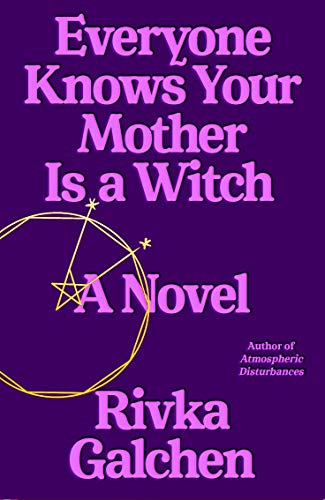Everyone Knows Your Mother Is a Witch, by Rivka Galchen. (New York: Farrar, Straus and Giroux, 2021) | amazon
In 1616 the forces of the Thirty Years’ War gather to wreak a brutal slaughter on Europe. Certainties of property, religion, and community crumble for all, high and low—especially for an elderly woman accused of witchcraft in a small German town.
This is history: In 1616, Katherina Kepler, mother of astronomer Johannes Kepler, was tried for witchcraft.
From that premise, Rivka Galchen built her debut novel on historical studies and documents from the period, including extant records of Katherina Kepler’s trial and letters by those involved. What grips the reader, though, is Galchen’s revelation, through fiction’s devices, of the mounting “case” against Katherina.
The evil seed Katherina’s accuser cultivates is covetousness—or is it genuine fear? Katherina is a solitary widow who prescribes herbal potions to the sick, some of whom die despite her care…or because of it. She has a saucy, individualistic attitude. Her son Johannes is in bad graces with the Lutheran powers, excommunicated due to his refusal to accept the “real presence” of the body and blood of Christ in the communion host. Her accuser is in debt to her other son. Worst of all, perhaps, Katherina has something her accuser wants, a nice piece of property.
Katherina must be a witch. After all, everyone knows…
The force of Katherina’s personality keeps us at and on her side, along with her reluctantly loyal but stalwart neighbor and guardian, to whom she dictates her “account.” The story she tells is incisive and entertaining, and at times poetic. It rarely lacks humor even as Katherina’s situation goes from bad to worse. She reveals herself, by turns, as pious, helpful, interfering, kind, mocking, assertive, illiterate, stubborn, needy, independent, strong-minded, wise. Anyone who pays attention to their neighbors will have met someone like her, and will know just how exasperating and endearing they can be. She’s not above retailing juicy gossip, at least to Simon, and skewering the local worthies. The “whiskered ducal governor,” whom she nicknames The False Unicorn, “looks like an unwell river otter in a doublet.” About her accuser, she claims, “everyone knows” that “the Werewolf…took powerful herbs given her by the apothecary—the apothecary with whom she had an affair before her first marriage.” She dotes on her cow Chamomile as much as anyone might dote on their pet dog or cat.
Katherina freely shares her considerable expertise in herbalism, whether asked or not. This at-times intrusive kindness laid the premise of the charge against her, but as her son Christoph remarks in reference to three other women recently executed for witchcraft, “The only important questions are how many thalers were seized from those women, and to whom those thalers went.”
More devastating, in a sense, than the bold accusations of her enemies are the depositions given by the suggestible, the lame-brained, the tale-spinning, the jealous, and the casually malicious. “Everybody knows that Hans’s [Johannes’s] mother is a witch and everyone has known for a long time,” says a former rival of Johannes, though such accusations have never arisen before. Says another, who claims Katherina laid a physical malady on him, “I’ve done things I regret in my life. I believed that God was punishing me for them. Maybe Katherina was God’s means for doing so.” Galchen skillfully pulls the reader dangerously close to the current that conspires to pull Katherina under.
It can be hard to resist what “everyone knows.”
Reputations destroyed by say-so; accusations defended not with evidence but with political ploys; devastating pile-ups: to borrow from historian Barbara Tuchman, Rivka Galchen’s absorbing novel holds up a “distant mirror” of our time.
